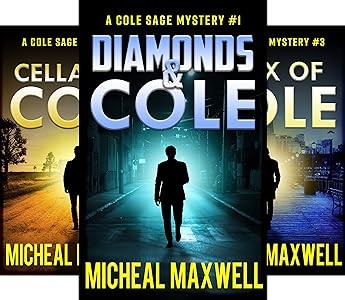The inherent sense of mystery, danger, and high stakes in crime fiction novels creates a strong connection between the characters and readers. Emotional elements in a crime fiction story can elevate it from a standard mystery tale to an unforgettable drama with resonance when effectively utilized. Taking inspiration from Micheal Maxwell's "The Cole Sage Mysteries" in this blog, let’s analyze the process of emotional storytelling in crime fiction and why it produces such compelling narratives.
Establishing Empathy Through Characterization
At the core of any impactful crime fiction story lies complex characterization that allows readers to understand and empathize deeply with the key players. The protagonist, whether a detective, victim, witness, or criminal mastermind, shoulders most of this emotional connection.
In "The Cole Sage Mysteries," Maxwell brings to life the intricate details of Cole Sage – his personality, backstory, relationships, desires, and inner demons, making them relatable to the readers. This characterization produces an innate empathy within us, driving up engagement with each twist and turn of the plot.
Similarly, emotional depth given to side characters creates further layers of complexity. The backstories of victims such as Ellie make us deeply mourn their fate. Through such masterful characterization across the narrative, Maxwell succeeds in building psychological intimacy between the readers and the story.
Heightening Tension Through High Stakes
One of the most powerful aspects of emotional storytelling in the crime fiction genre is its ability to elicit empathy and understanding. Through the trials and tribulations of characters like Cole Sage in "The Cole Sage Mysteries," readers are drawn into a world of raw emotions and human struggles.
As Cole battles his inner demons and confronts the darkness lurking within society, readers experience a deep sense of empathy, forging a connection that transcends the boundaries of fiction. In doing so, emotional storytelling fosters compassion and understanding, reminding us of the shared humanity that binds us all together.
The Triumph of Emotion in Crime Fiction Novels
At its best, the emotional resonance created in crime fiction elevates it from genre entertainment into the artistic mainstream. Like literary fiction, it pulls the readers' heartstrings and immerses them wholly into intricately crafted worlds. Unlike superficial thrillers, the payoffs here feel deeper as they echo the eternal themes of the human condition - the corrupting nature of power, the primal need for love, and redemption despite the odds. Though dark mysteries and dangerous characters drive the novel’s engine, emotional storytelling remains the true triumph of immersive crime fiction.
If you are interested in learning more about the impact of emotional storytelling in the crime fiction genre, "The Cole Sage Mysteries" by Michael Maxwell is the book for you. Through the lens of Cole's struggles and triumphs, we witness the complexities of the human experience as he refuses to waver in his pursuit of justice and redemption.
Grab your copy of "The Cole Sage Mysteries" today!


No comments yet